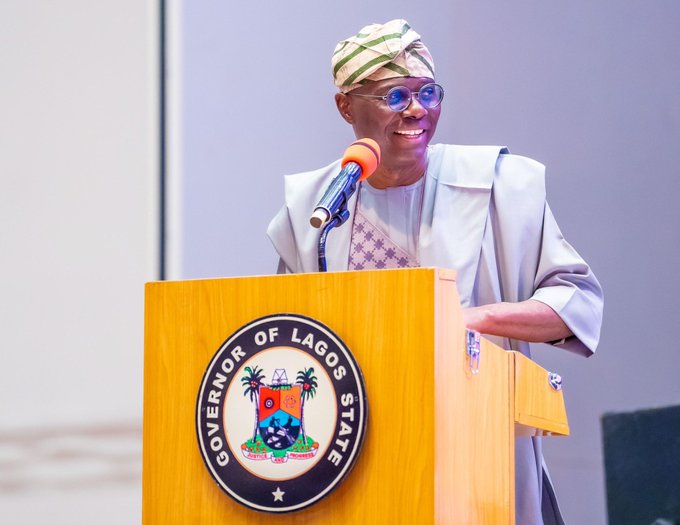Governor Babajide Sanwo-Olu of Lagos State has described the October 2020 EndSARS protest as one of the most difficult moments in his leadership journey.
Sanwo-Olu made this revelation during a recent meeting with 30 fellows of the Lateef Jakande Leadership Academy in Ikeja, Lagos.
The governor candidly reflected on the challenges his administration faced during the protests, noting that it was a period that tested his leadership in ways few had expected.
“One of my toughest moments as a leader was during the EndSARS protest,” Sanwo-Olu said. “We have been tested as a government, but we must continue to put the needs of Lagosians beyond our struggles as a responsive and responsible government.”
He acknowledged the gravity of the situation, stressing that leadership is about resilience and staying focused on the welfare of the people, even in times of hardship.
Sanwo-Olu went on to offer advice to the fellows, urging them to always aim for excellence in their leadership efforts. “No bad news stays forever. Work hard to create good news and make sure people listen to it,” he said, encouraging the young leaders to focus on making a positive impact in their communities.
The conversation also turned to the importance of intentional leadership. The governor highlighted that being chosen for the Lateef Jakande Leadership Academy was an accomplishment in itself. “For you to have been selected out of 16,000 applicants means there is something of value in you,” he remarked, acknowledging the exceptional potential of the fellows.
He emphasized that leadership should not be left to chance but must be a deliberate and thoughtful pursuit. This is why the academy was established in the first place, he explained. “Leadership is something we should be deliberate about, which is why we created this academy,” he said. “You all are champions of good leadership. Challenge yourselves. The only limitation you have is not dreaming big enough.”
Sanwo-Olu also took a moment to remind the fellows about the importance of remembering past leaders who exemplified excellence. He referenced Alhaji Lateef Jakande, the former governor of Lagos State, who he described as an embodiment of strong leadership. “I know your generation may not know who Alhaji Lateef Jakande was,” he said. “That is why we are still talking about him today.”
The governor’s words were meant to inspire the young leaders to learn from the legacy of great figures like Jakande, whose leadership continues to shape the state today.
Sanwo-Olu also spoke about the need for leaders to show courage and resilience when faced with adversity. He stressed that a good leader must be able to endure hardships and face challenges with resolve.
“A trait of a good leader is the ability to tolerate and endure,” the governor said. “That is why we need you to stay together so you will learn how to tolerate each other and make meaningful friendships. You need to be courageous and be solution-oriented, don’t focus on the challenges.”
The Executive Secretary of the academy, Mrs Ayisat Agbaje-Okunade, expressed gratitude to the governor for sharing his insights with the fellows. “We are grateful to the governor for taking time to address the fellows,” she said. “His words are sure to inspire them on their leadership journey.”
The Lateef Jakande Leadership Academy was established to help develop young, change-oriented individuals who are passionate about shaping the future of Nigeria. The academy provides a platform for future leaders to learn from experienced mentors and gain the skills needed to address the challenges facing the country.
Sanwo-Olu’s reflections on the EndSARS protest provide a unique insight into the difficulties faced by leaders in times of national crisis. His message was clear: true leadership is about staying focused on the greater good, even when faced with overwhelming challenges.
The EndSARS protest, which began in October 2020, was sparked by widespread demands for an end to police brutality and an overhaul of the Special Anti-Robbery Squad (SARS). What started as peaceful protests quickly escalated into violent confrontations between demonstrators and security forces, leading to widespread unrest in Lagos and other parts of Nigeria. The aftermath of the protests left a lasting impact on the nation and posed significant challenges for both the government and the people.
For Sanwo-Olu, the period was a test of leadership. The governor faced immense pressure to manage the crisis while also addressing the concerns of protesters and ensuring public safety. Despite the difficulties, he remained committed to moving Lagos forward and ensuring that the state’s development continued.
Sanwo-Olu’s leadership during the crisis was a subject of much debate, with many praising his efforts to engage with protesters and his handling of the aftermath. However, there were also criticisms, particularly regarding the way the security forces handled the protests, especially the tragic events at the Lekki Toll Gate.

